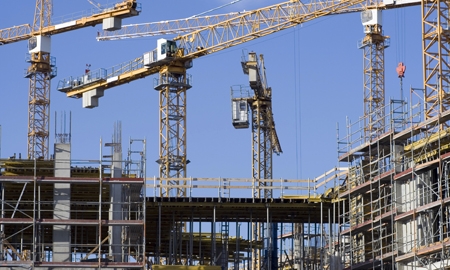Anxious to address the severe housing crisis and to respond to rising public expectations, President Abdelaziz Bouteflika has made the housing sector a priority in his government programme, with the objective of both increasing significantly the numbers of new houses built, and of diversifying the range of housing available.
The rate of construction of new housing and of public buildings has accelerated continuously over the last 10 years, enabling a reduction in the existing deficits. The development of the index of housing stock is a good indicator. Estimated at 1.9 million units at the end of 1962, the index stood at 7.2 million units in 2010. Between 1999 and 2011, 2.1 million units were delivered, a policy that has been further strengthened with the adoption of a target of completing an additional 1.2 million units by the end of 2014 – effectively a construction rate of almost 270,000 units per year from 2012.
Meanwhile, household occupancy rates have reduced from 6.39 per household in 1987 to 4.86 in 2010, and should reduce to 4.59 persons by the end of 2014 following the conclusion of the five-year programme initiated in 2010. The government’s determination is illustrated by the level of financial support dedicated to this objective: the housing sector has been allocated a budget of almost $60 billion (£38.5 billion), equal to 20 per cent of the total budget of the $286 billion five-year plan.
The government has also intensified its support for rented social housing for the most disadvantaged members of society. The 2010-14 programme calls for the construction of a million units of rented social housing; nearly 400,000 are needed immediately to help eliminate housing of marginal quality, and the balance will provide a further boost to the nation’s living conditions.
Rural housing is also receiving attention with the construction of 900,000 units during the 2010-14 period, accounting for 40 per cent of government support for the revitalisation of rural areas.
The objective of improving the supply of housing is also linked to a second challenge – that of supervising the development in strict accordance with modern urban planning methodology. Urban development is subject to a rigorous legal and regulatory framework, and Law No 90-29 of 1 December 1990 put in place two framework instruments: the development and urbanism masterplan (PDAU) and the zoning plan (POS). Every populated area across the country today has a PDAU designed to enable orderly urban expansion with greater efficiency and effectiveness.
As part of this process, the National Agency for Town Planning (ANURB) was created in 2010, tasked with reinforcing the legal and institutional framework of building, and its cohesion and efficiency. A centre of technical excellence serving the state and local communities, ANURB aims to be a guarantor of quality in urban development, working to meet the expectations and demands of Algerian citizens in the raising of their living standards.
The organisation was designed to work as a forum for debate on the effectiveness of urban policy, and also combines the activities of the Algerian Centre for Planning and Architectural Studies (CNERU) and the 11 local divisions of ANURB (URBs), in order to make them more effective in their given roles. ANURB promotes and ensures a consistent approach to urban planning, encouraging the adoption of a fresh approach to the planning process, while always taking into account the future needs of the country.

0 COMMENTS